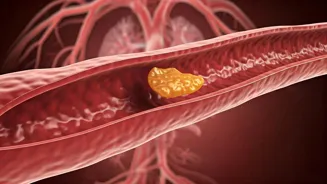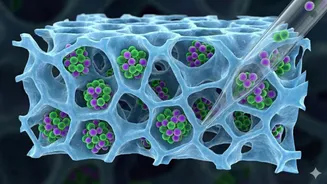Embrace a Heart-Healthy Diet
One of the primary methods to cleanse arteries involves adopting a heart-healthy diet. This means making significant changes to your eating habits by incorporating
foods that actively support cardiovascular health. Prioritize the intake of fruits and vegetables, which are rich in antioxidants and fiber. These nutrients help in combating free radicals and reducing inflammation, which are contributors to plaque formation. Include whole grains in your diet, as they contain vital nutrients and fiber that contribute to maintaining healthy cholesterol levels. Also, incorporate lean proteins like fish (particularly those rich in omega-3 fatty acids), poultry, and legumes. These food choices help to lower levels of harmful LDL cholesterol and boost overall heart health. It is crucial to limit the intake of saturated and trans fats, as these can elevate cholesterol levels and increase plaque buildup. Avoid processed foods, sugary drinks, and excessive amounts of red meat to protect your arteries. Emphasizing foods that provide antioxidants, which protect blood vessels from damage, is key to a heart-healthy eating approach.
Boost Physical Activity
Regular physical activity is a crucial element in cleansing arteries and fostering cardiovascular health. Engaging in consistent exercise helps in several ways to reduce plaque buildup and boost overall heart function. Exercise improves circulation, which allows the blood to flow more freely through your arteries, decreasing the risk of plaque formation. Activities like brisk walking, jogging, swimming, or cycling can effectively keep your heart healthy. The American Heart Association recommends at least 150 minutes of moderate-intensity or 75 minutes of vigorous-intensity aerobic exercise per week. Beyond aerobic exercise, incorporating strength training two to three times a week is also recommended. Strength training helps in building muscle mass, which in turn supports healthy metabolism. Consistent exercise helps in lowering bad cholesterol (LDL) levels and raising good cholesterol (HDL) levels, which protects against arterial plaque. Regular physical activity is not just about physical health; it also improves mental well-being. Exercise reduces stress and improves mood, further aiding heart health by keeping these contributing factors in check.
Manage Stress Levels
Chronic stress can significantly contribute to arterial plaque buildup, so effective stress management is an important component of artery cleansing. High stress levels lead to the release of stress hormones like cortisol, which can increase inflammation and elevate blood pressure, both of which play a role in plaque development. Various strategies can help manage stress and promote cardiovascular health. Consider incorporating relaxation techniques such as deep breathing exercises, meditation, or yoga into your daily routine. These practices help in calming the mind and body, decreasing the negative impacts of stress. Engaging in activities you enjoy, such as spending time in nature, listening to music, or pursuing hobbies, can also reduce stress levels. Ensuring adequate sleep is also crucial, as sleep deprivation can increase stress and negatively impact heart health. Building a strong support system of friends and family can provide emotional support during stressful times. This can help lessen the emotional burden and improve overall mental well-being. By consciously managing stress, you can protect your arteries and promote heart health.
Quit Smoking and Tobacco
Quitting smoking and avoiding tobacco products is essential for maintaining healthy arteries and lowering the risk of plaque buildup. Smoking damages blood vessels and speeds up the process of atherosclerosis, leading to the formation of arterial plaque. Cigarettes contain numerous harmful chemicals that impair the ability of the arteries to function properly and accelerate plaque formation. When you quit smoking, your body begins to recover quickly. Within a short time, blood circulation improves, and the risk of heart disease decreases. Avoiding all forms of tobacco, including chewing tobacco and vaping products, is important. These products also contain nicotine and other harmful substances that affect cardiovascular health. Several resources are available to help people quit smoking, including nicotine replacement therapy, counseling, and support groups. Combining these methods can significantly boost your chances of success. Avoiding tobacco products entirely contributes to preventing arterial plaque buildup and promoting long-term heart health. If you smoke or use tobacco, seeking help to quit is one of the best decisions you can make for your health.
Consider Supplements
Incorporating specific supplements can support arterial health, although they should be used in conjunction with lifestyle changes and under the guidance of a healthcare professional. Omega-3 fatty acids, found in fish oil, have been shown to reduce inflammation and improve cardiovascular function. These fatty acids help in lowering triglyceride levels, which is beneficial for heart health. Fiber supplements, such as psyllium husk, can assist in reducing cholesterol levels by binding to cholesterol in the digestive system, thereby preventing its absorption. Coenzyme Q10 (CoQ10) is an antioxidant that supports heart health and can help protect against damage to blood vessels. Garlic supplements are believed to have properties that lower cholesterol levels and prevent the formation of arterial plaque. When considering supplements, it's important to discuss them with a healthcare provider, as some supplements may interact with medications or have side effects. A healthcare professional can provide personalized recommendations to ensure the supplements align with your overall health goals and do not cause any adverse effects. Supplements can be a beneficial part of a comprehensive approach to heart health when used correctly and responsibly.




















